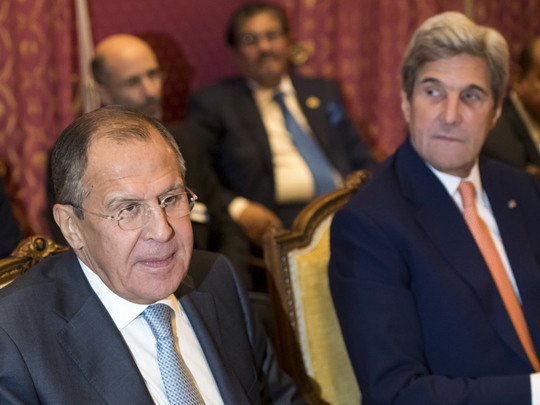
Zbigniew Brzezinski, former United States national security adviser and an influential international relations theorist famous for his anti-Soviet views during the Cold War, recently penned a lengthy article titled Toward a Global Realignment. In his piece, Brzezinski argues that “as its era of global dominance ends, the United States needs to take the lead in realigning the global power architecture”.
Thomas Graham, another renowned international relations expert and a managing director of Kissinger Associates, in his article titled Kennan’s Long Telegram needs an update for Putin’s Russia, argues that the unipolar post-Cold War international system is over. Graham asserts that “the times call for a new relationship, without illusions about what Russia is and where it is headed”. The Cold War model “cannot... be replicated today”, he maintains.
George Kennan, the American diplomat famed for his Long Telegram that was sent from Moscow in 1946, argued that the Soviet regime was inherently expansionist and that its influence had to be “contained”. The telegram played a major role in shaping the Cold War.
Brzezinski argues that “the [unipolar] era is now ending”. This, according to Brzezinski, does not mean that in the near future any state is likely to match America’s economic-financial superiority. However, he contends that “new weapons systems could suddenly endow some countries with the means to commit suicide in a joint tit-for-tat embrace with the US or even to prevail. Without going into speculative detail, the sudden acquisition by some state of the capacity to render America militarily inferior would spell the end of America’s global role”. The outcome would most probably be global chaos, according to Brzezinski.
He concludes that “that is why it behoves the United States to fashion a policy in which at least one of the two potentially threatening states becomes a partner in the quest for regional and then wider global stability and thus in containing the least predictable but potentially the most likely rival to overreach. Currently, the more likely to overreach is Russia, but in the longer run it could be China”.
Brzezinski, who years ago was focused on bringing down the Soviet Union, now warns both America and Russia that “the alternative to a constructive vision, and especially the quest for a one-sided militarily and ideologically imposed outcome, can only result in prolonged and self-destructive futility”. Graham refutes the idea that the Russians’ rise as a challenger to US hegemony, after an almost two-decade disappearance from the international scene as an impactful actor, is merely because Russian President Vladimir Putin is ambitious and seeks to revive Russia’s stature and prestige.
“We need to stress,” Graham writes, “that what we are seeking to understand is the nature of the challenge posed by Russia, not by its current paramount leader, President Putin. This is a departure from much of the commentary in the United States, which focuses on, and demonises, Putin as the driving force behind a Russian threat, as if he operates outside an historical and political context.” This is exactly what Hillary Clinton, the Democratic Party candidate, tries to convey.
Graham says: “Like his predecessors since Peter the Great, who brought Russia into Europe as a great power, he is adamant that Russia — as a political and spiritual community — cannot survive other than as a great power.” Graham, one of the leading US experts on Russia, holds that Putin’s “authority is reinforced by an elite that, save for a small minority, shares this view, which also resonates with the broader population. Putin’s departure will not likely change the essence of the Russian challenge, no matter how different his successor’s style and tactics might be”.
This understanding is of the utmost importance, because the current tensions between the US and Russia on a variety of issues — primarily on the expansion of Nato, Ukraine and Syria — should not be understated by personalising them as Putin’s ambitions versus America.
The tragic Syrian war validates two things. First, it signifies the end of the post-Cold War unipolar world order and the realisation of a multipolar world crowded with state and non-state actors. Second, it demonstrates that international and humanitarian crises only worsen in the absence of collaboration between the two global powers. The open-ended Syrian war is a humaanitarian catastrophe of epic proportions. Perhaps US-Russia cooperation will not miraculously and immediately bring the crisis in Syria to an end. However, in the absence of such a collaboration and under a hostile, uncertain environment, the crisis in Syria can only deepen with no end on the horizon
But there is more to this conflictual US-Russia relationship that has been a major cause of the lingering and deepening Syrian crisis. All parties agree that Syria is the breeding ground for terrorism, which threatens the security of the world, primarily the US and the West as a whole, and the American allies and interests in the region. The Syrian conflict also seriously threatens the security of Russia. In 2015, the deadly Chechen terror group in the Caucasus region in southern Russia, Caucasus Emirate, which has committed hundreds of terrorist attacks in Russian territory, pledged allegiance to Daesh.
The more substantial danger of the continuation of the US-Russia conflict and the lack of strategic and enduring cooperation between them is that the existing hostile Iran-Saudi or Iran-Israel relations can spiral out of control. This would lead to calamitous consequences for the already shaky and unstable region.
Interestingly, Donald Trump, the Republican presidential candidate in the US, insists on the route suggested by Brzezinski and Graham with respect to US-Russia relations. Conversely, his Democratic rival, long-time-politician Hillary Clinton, constantly slams Trump on this position and promises to adopt tougher policies against Putin and Russia.
Shahir ShahidSaless is a political analyst and freelance journalist writing primarily about Iranian domestic and foreign affairs. He is also the co-author of Iran and the United States: An Insider’s View on the Failed Past and the Road to Peace.









